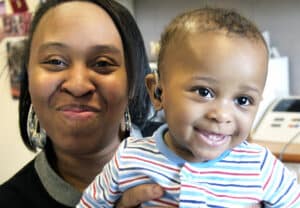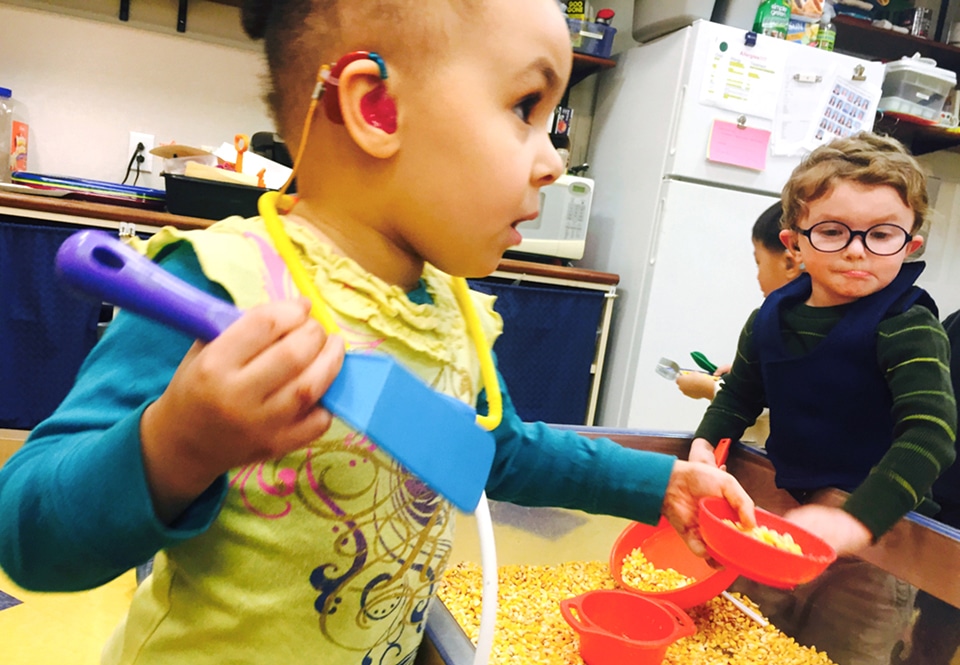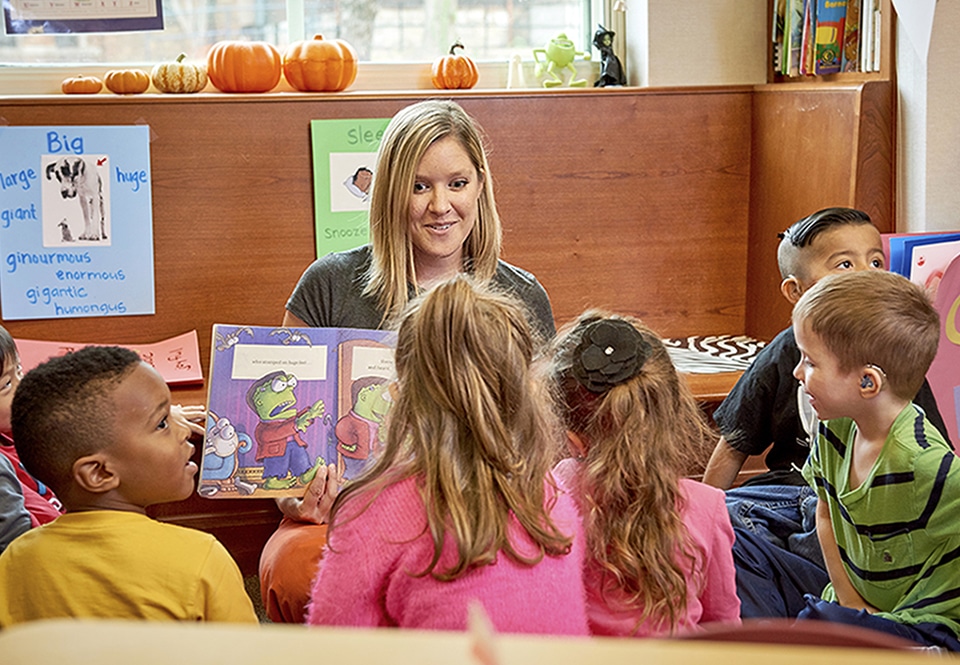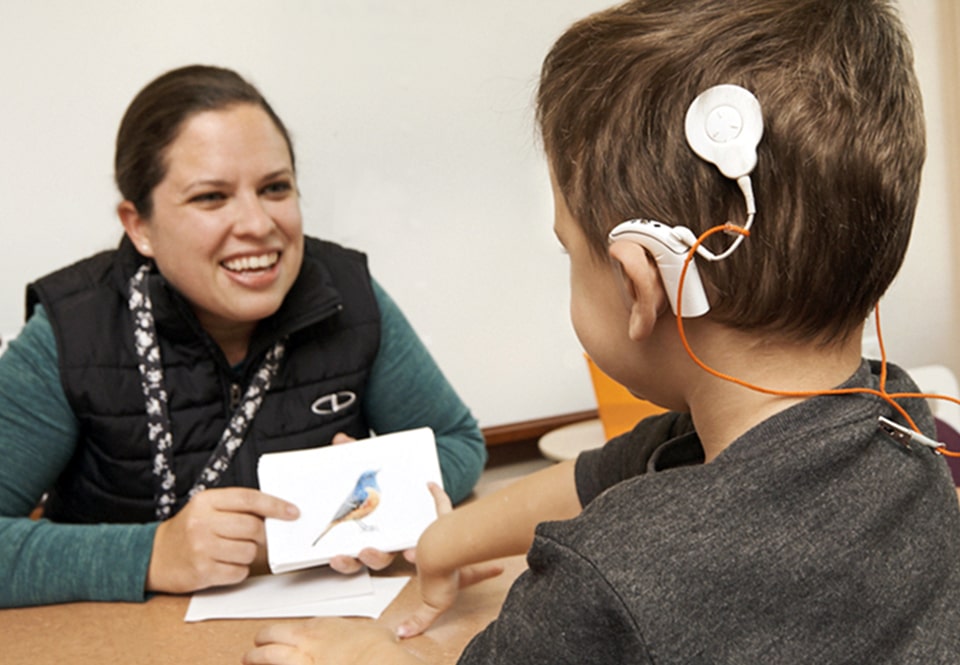Educational Philosophy

LISTENING & SPOKEN LANGUAGE
Since 1914, CID has been teaching children who are deaf and hard of hearing to listen and talk without the use of sign language. Most children with a hearing loss have hearing parents who use spoken language (90–95%), so it’s not surprising that many parents desire that their children also learn to use spoken language. With early and intensive intervention, many children who are deaf or hard of hearing are able to learn to listen and talk, leading to greater independence and limitless opportunities.

EARLY INTERVENTION
Starting as early as possible, CID works closely with parents and caregivers to get their child optimal access to sound and then help them make the most of the sound their child receives through hearing devices. Our goal is to empower parents and caregivers — through knowledge and supported practice — to positively affect their child’s growth and development. We tailor our education and coaching to the needs of each individual child and family. We build collaborative relationships and have high expectations for active involvement.
CID’s approach differs from that of traditional schools or clinical therapies in that a parent educator visits the child and caregivers at home, and sometimes at day care or other community settings. We also offer remote coaching sessions to accommodate busy families and families who live outside of driving distance from CID. The parent educator coaches caregivers on ways to foster listening and spoken language development at home within the context of their typical routines and activities. CID also offers a class that provides group and individual instruction for toddlers starting at 18 months old. The goal of early intervention — whether in the home, in toddler class or both — is for children to develop age-appropriate skills in all developmental domains with an emphasis on communication.

THE IMPORTANCE OF PLAY
CID not only provides individualized instruction for listening, speech and language skills, but also supports other developmental domains, including the development of social skills. Our early childhood program is designed to help young children achieve all of these skills through play.
Play is the work of the young child. Through play, preschoolers learn about their world. Play enables them to develop in every domain — cognitive, listening, language, speech, gross motor, fine motor, social-emotional and pre-literacy. Play, language and literacy are tightly interwoven. As children’s language and play skills develop, they also develop the foundational skills necessary to become readers.

LITERACY IS FUNDAMENTAL
Literacy is necessary for academic success. At CID, we start early, fostering emerging literacy skills from birth. Our parent educators encourage caregivers to read to their babies early and often. Story time and pre-literacy activities are introduced in toddler class. Preschool teachers build skills in phonological and phonemic awareness, alphabet knowledge, print awareness, text comprehension and story sequence. They use best practices from general education and from listening and spoken language deaf education to foster emerging literacy skills. Daily reading instruction starts by age 5. CID teachers plan reading lessons using the SPIRE curriculum, providing direct, systematic phonics instruction.
Reading and literature are incorporated into the children’s language arts period. The focus is on comprehension, skills instruction and high-quality children’s literature that helps stimulate language comprehension, listening ability, literacy and cultural awareness. Fiction and nonfiction selections provide exposure to fables, folk tales, adventure stories, fantasy, science fiction, biographies and more. CID teachers read to the children regularly and model thought processes behind reading. Importantly, CID teachers model an unbridled enthusiasm for reading and encourage parents to do the same.
We also have exciting, language-rich learning activities. We have a great children’s library and an annual literacy fair. We have reading incentive programs and offer books to loan, books to buy, books for school and books for home.
As a testament to our program, CID students often select reading as a free time activity both at home and at school. Parents tell us how the program has increased their child’s interest in reading and the quantity of time their child spends reading.

SPEECH, LANGUAGE & ACADEMICS
We offer a language-rich, assessment-based educational program individualized to help every child achieve success. We follow each child’s skills through a continuum of settings, from structured, small-group classroom lessons to larger group activities that promote more natural interaction.
Our dynamic early childhood preschool curriculum is adapted from general education and emphasizes emerging literacy and pragmatic skills as well as the whole child. The program focuses on listening, speech and language as well as pre-math, pre-reading and social skills. Along with instruction in all academic subjects, the kindergarten curriculum provides opportunities for high-level imaginative and collaborative play that develops the language skills necessary to achieve later success in reading.
For our primary school students, our philosophy is to build a foundation for success in education and in every area of life. Guided by Missouri Learning Standards and commercial curricula, CID teachers use intensive listening and spoken language teaching strategies to teach grade-level academics. Our students receive instruction in reading, writing, math, science and social studies, computer skills and more. Hands-on learning, STEM activities and educational field trips are built into a comprehensive program that also includes gym, art and music and a social skills curriculum. Extracurricular opportunities range from pickleball and tennis to music and dance.
Children typically leave CID when they’re ready to enter schools in their home communities. They play sports, compete on debating teams, serve on student councils, participate in social events, dance, act in plays and have typical school experiences along with their hearing peers.
